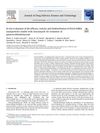November 2023 in “IntechOpen eBooks” Arsenic exposure from contaminated water severely damages the skin, causing hair loss, pigmentation changes, irritation, and can lead to skin cancer.
 July 2023 in “Journal of allergy and clinical Immunology. Global”
July 2023 in “Journal of allergy and clinical Immunology. Global” A 10-month-old boy with a rare combination of genetic conditions has severe immune deficiency and treatment challenges.

Thermal spring waters and their microbes could be good for skin health and treating some skin conditions in skincare products.
 June 2023 in “Frontiers in Medicine”
June 2023 in “Frontiers in Medicine” Protein tyrosine kinases are key in male pattern baldness, affecting skin structure, hair growth, and immune responses.
 June 2023 in “Pharmaceuticals”
June 2023 in “Pharmaceuticals” Men and women respond differently to drugs for COVID-19, high cholesterol, and diabetes, which suggests a need for personalized treatments.
 May 2023 in “International Journal of Molecular Sciences”
May 2023 in “International Journal of Molecular Sciences” Mesenchymal stem cells could help treat radiation-induced bladder damage but more research is needed to overcome current limitations.
 January 2023 in “Karger Kompass. Dermatologie”
January 2023 in “Karger Kompass. Dermatologie” Scientists are still unsure what triggers the immune system to attack hair follicles in Alopecia areata.
 July 2022 in “Journal of the Dermatology Nurses' Association”
July 2022 in “Journal of the Dermatology Nurses' Association” The document encourages attending the 2023 Dermatology Nurses' Association Convention.
 June 2022 in “Al- Anbar Medical Journal”
June 2022 in “Al- Anbar Medical Journal” COVID-19 can cause skin problems.
May 2022 in “Journal of the Dermatology Nurses' Association” The convention highlighted the importance of comprehensive patient care and early diagnosis in dermatology.
 January 2022 in “IntechOpen eBooks”
January 2022 in “IntechOpen eBooks” Some lesser-known causes of PCOS include autoimmune issues, genetic mutations, and changes in the body's microbiome.
May 2021 in “Veterinarìâ, tehnologìï tvarinnictva ta prirodokoristuvannâ” Treating sheep and wild goats with specific medications and bathing sheep was 100% effective against a contagious skin disease caused by mites.
June 2019 in “International journal of dermatology and venereology” The Hedgehog Signaling Pathway is important for skin and hair development and skin cancer treatment, but more research is needed to understand it fully.
 January 2017 in “Journal of Investigative Dermatology Symposium Proceedings”
January 2017 in “Journal of Investigative Dermatology Symposium Proceedings” The 2015 Hair Research Congress concluded that stem cells, maraviroc, and simvastatin could potentially treat Alopecia Areata, topical minoxidil, finasteride, and steroids could treat Frontal Fibrosing Alopecia, and PTGDR2 antagonists could also treat alopecia. They also found that low-level light therapy could help with hair loss, a robotic device could assist in hair extraction, and nutrition could aid hair growth. They suggested that Alopecia Areata is an inflammatory disorder, not a single disease, indicating a need for personalized treatments.
 September 2014 in “Aktuelle Dermatologie”
September 2014 in “Aktuelle Dermatologie” The symposium concluded that environmental factors significantly contribute to skin aging.
 82 citations,
June 2020 in “Inflammation Research”
82 citations,
June 2020 in “Inflammation Research” Skin problems in COVID-19 patients are rare and may be due to the body's complex immune response or blood clotting issues.
 14 citations,
May 2013 in “Emerging infectious diseases”
14 citations,
May 2013 in “Emerging infectious diseases” Cryptococcus gattii can remain dormant in animals for over 8 years.
 75 citations,
January 2014 in “Korean Journal of Urology”
75 citations,
January 2014 in “Korean Journal of Urology” 5α-reductase inhibitors can cause sexual problems, higher risk of aggressive prostate cancer, and depression.
 1250 citations,
August 2021 in “Scientific Reports”
1250 citations,
August 2021 in “Scientific Reports” COVID-19 leaves 80% of patients with long-term symptoms like fatigue and headaches.
 41 citations,
September 2007 in “Pediatric emergency care”
41 citations,
September 2007 in “Pediatric emergency care” Oral medication is necessary to treat scalp fungus in children, with griseofulvin being the usual choice.
 36 citations,
December 2015 in “Drugs”
36 citations,
December 2015 in “Drugs” New treatments for a chronic skin condition show promise, but individualized plans are crucial due to varying responses.
 36 citations,
August 2011 in “Journal of Controlled Release”
36 citations,
August 2011 in “Journal of Controlled Release” Genetically-altered adult stem cells can help in wound healing and are becoming crucial in regenerative medicine and drug design.
 17 citations,
May 2021 in “Journal of Assisted Reproduction and Genetics”
17 citations,
May 2021 in “Journal of Assisted Reproduction and Genetics” COVID-19 may harm male fertility and damage the reproductive system.
 8 citations,
March 2018 in “Journal of Drug Delivery Science and Technology”
8 citations,
March 2018 in “Journal of Drug Delivery Science and Technology” Itraconazole-loaded nanoparticles are more effective and less toxic for treating fungal infections than conventional oral itraconazole.
 1 citations,
November 2014
1 citations,
November 2014 The document explains hair and nail biology, common hair loss conditions and treatments, oral and genital skin diseases, and the risks and treatments associated with squamous cell carcinoma.

There are many treatments for common hair loss, but more trials are needed to decide which are best.

L-PGDS has specific binding sites for its functions and could help in drug delivery system design.
 January 2019 in “Open access journal of mycology & mycological sciences”
January 2019 in “Open access journal of mycology & mycological sciences” The article concludes that proper antifungal treatment is essential for treating scalp fungal infections in children, and trichoscopy is useful for diagnosis and monitoring.
 June 2008 in “British Journal of Dermatology”
June 2008 in “British Journal of Dermatology” UK medical students lack dermatology education, liver biopsy patients with risk factors show more fibrosis, and certain fungi resist drugs due to melanin; genetics may influence female hair loss.
 November 2021 in “Egyptian Journal of Medical Microbiology”
November 2021 in “Egyptian Journal of Medical Microbiology” COVID-19 protective measures led to skin irritation, hair loss, and brittle nails; using skin-friendly products and a healthy diet is recommended.

























